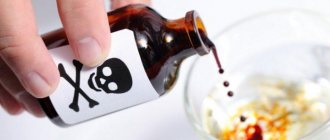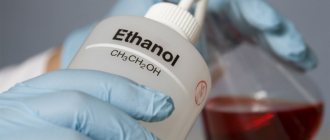Symptoms
External manifestations of intoxication appear gradually. At the initial stage of intoxication, you can recognize a drunk person by dilated pupils, an unsteady gait, redness of the face and a characteristic odor from the mouth. With an increase in alcohol concentration, clouding of consciousness is observed, nausea may appear, and vomiting may begin. After sleep, intoxication will remind you of itself with headache, dehydration, dizziness.
The symptoms of severe alcohol poisoning are much more serious. External manifestations include incoherent speech, loss of balance, and lack of response to any external stimuli. As symptoms increase, alcohol damage begins to develop rapidly: loss of consciousness, weak breathing, paleness of the skin. In the extreme stage, deep coma and even cardiac arrest are possible.
Symptoms
Doctors distinguish 3 degrees of alcohol poisoning, which are characterized by different symptoms:
- mild (a person is excited, active, his self-control decreases, there is an excessive manifestation of certain character traits and slight intoxication);
- moderate (speech becomes unintelligible, mental activity and spatial orientation are impaired, drowsiness may occur);
- severe (unconsciousness, interruptions in breathing, decreased blood pressure and body temperature).
Treatment of alcohol poisoning at home
The body needs help to remove ethyl alcohol, neutralize toxins and other breakdown products. Therefore, the first aid for alcohol poisoning is gastric lavage. To clear the esophagus, it is necessary to induce artificial vomiting. You can use the traditional method - drink a few glasses of salted water with soda. Manipulations must be carried out until the stomach is completely cleansed.
It is worth knowing that in a severe stage, such treatment of alcohol poisoning at home is simply unacceptable. The correct action in this situation is to call an ambulance or independently transfer the victim to the hospital. While waiting, it is worth providing the following assistance: turn the person on his side, stick out his tongue to prevent gastric juice or food debris from entering the respiratory tract.
- Tsarsky salad - recipes with photos. How to cook Tsar's salad with seafood and red caviar
- Motilak - instructions for use for adults and children. What does Motilak help with and contraindications
- Brown rice
Why play with your own health?
Despite the obvious advantage of the methods of official medicine over various folk recipes, the latter, for some paradoxical reason, are still wildly popular with the majority of those who are prone to alcoholic binges. Of course, each person is free to decide for himself how to manage his own health or even life, but still, if we talk about the most preferable way to cleanse the body of alcohol, then we must recognize one simple, immutable fact: there is simply nothing more effective than seeing a doctor, and therefore the right choice is obvious.
Antipenko Viktor Nikolaevich Doctor - narcologist. Psychotherapist. Psychiatrist
Calling a narcologist to your home
Not everyone experiences alcohol with euphoria. Some patients, when intoxicated, become violent, get into fights, or try to commit suicide. In this case, drug treatment at home is an ideal option. Qualified specialists will help pacify the drunk, give the right medications and put on an IV. In addition, if necessary, calling a narcologist to your home can be done anonymously.
Dropper for alcohol intoxication at home
In extreme cases, or for binge alcoholics, doctors recommend IV drips. They help to quickly cleanse the blood, remove the remaining alcohol, and bring the drinker to his senses without a trip to the hospital. Another undoubted advantage of droppers for alcohol intoxication at home is the ability to adjust the composition based on the patient’s medical history and symptoms.
Very often the following combinations of drugs are used for treatment:
- Glucose solution with salt - to thin the blood. It helps replenish the amount of cerebrospinal fluid in the bloodstream.
- Glucose 10% with magnesium plus insulin - to restore overall water balance.
- Soda solutions - to prevent metabolic acidosis.
- Electrolytes, butanedioic and maleic acid or sodium thiosulfate with unithiol - for the active elimination of alcohol from the blood plasma and the body as a whole.
- Glucose 5-10% with small doses of insulin - to increase blood sugar levels and prevent oxygen starvation of the brain.
What to drink if you have alcohol poisoning
If the degree is mild, what to do at home? You can try to recover without medical help: with professional or improvised means. All absorbents available in the house are perfect: activated carbon black or white, enterosgel, sorbex and others. Try making simple herbal infusions. In addition, in case of alcohol poisoning, you need to drink a lot of medicinal mineral water, still water, and simple sweet tea.
Phytotherapy
Among the medicinal herbs that effectively help with poisoning are mint or lemon balm leaves, chamomile, grated ginger root, tansy, and dill seeds. For independent herbal medicine, try preparing one or more decoctions according to the following schemes:
- Take 3-4 lemon balm sprigs, mash them with your hands and put them in a thermos. Infuse the mixture for at least two hours. The finished infusion should be consumed throughout the day.
- Pour two tablespoons of dill seed into ½ glass of water and boil for 5-7 minutes. Cool the drink slightly, divide into two halves. Apply according to this scheme: one part in the morning, the second in the evening.
- Grate or finely chop the ginger root. Pour a liter of boiling water over the raw material and let it brew. Then add a little liquid honey, divide into 3-4 parts and drink throughout the day.
Preparations for the removal of alcohol intoxication
Along with available folk remedies, medications will help you get rid of the consequences of a noisy party. Drugs for relieving alcohol intoxication can be divided into three parts:
- Enterosorbents help restore intestinal microflora, improve digestion, and help normalize stool. This group of drugs includes: activated carbon, smecta, polyphepan, polysorb, enterosgel, algisorb and others.
- Symptomatic medications - speed up metabolism, increase performance, fight migraines. Buy biotredin, zorex, limontar, yantavit, glycine, alko-seltzer at the pharmacy.
- Homeopathic remedies - break down alcodehyldrose, normalize metabolism. These include: Proprothene 100 and Anti-E.
- Diet after intestinal surgery
- How to make ripped jeans - step by step photos and videos. DIY ripped jeans at home
- How to look at the earth from a satellite in real time
Gastric lavage
When providing first aid to the victim, it is necessary to clear the stomach of alcohol residues to prevent them from entering the bloodstream.
A person is given up to 4 glasses of warm water to drink, and the root of the tongue is pressed with a finger or a spoon.
It is recommended to induce vomiting up to 3 times to produce clean rinsing water.
During the procedure, it is recommended to tilt the victim’s torso and keep the head horizontal.
It is effective to cleanse the stomach with a solution prepared by mixing 1 tablespoon of soda in a liter of boiled water.
You can prepare a solution of ammonia in a ratio of 5-10 drops per 1 glass of water to sober up and induce a gag reflex.
Important! If a person feels worse after vomiting, you can take a 5-minute break between washes.
After completing the cleansing procedure, it is recommended to take the sorbent 5 minutes later:
- activated carbon at the rate of 1 tablet per 1 kg of body weight;
- Polysorb;
- Enterosgel;
- Filtrum;
- White coal;
- Polyphepan;
- Smecta.
Do you know how first aid is provided for signs of stroke in men? Read the recommendations in this useful article.
The benefits of bee bread for men are written here.
Strong natural sorbents are beets, strawberries, cabbage , as well as foods high in fiber ( vegetables, fruits, cereals ) and pectin ( carrots, raspberries, black currants, apricots ).
How to stop vomiting after alcohol poisoning
Very often, after drinking alcohol, a person feels sick, nausea appears, and attacks of vomiting occur. Doctors consider this to be the norm, but only to the extent that the urge to vomit begins to appear on an empty stomach. There are several ways to stop vomiting after alcohol poisoning:
- Apply a thick cloth soaked in ice water or ice cubes to the back of your head.
- Try to set up a sobering-up station in your house. Open all the windows wide and turn on the air conditioning.
- Drink some cold water. If there are restorative drugs available, like Regidron, then take the medicine.
When vomiting severely, it is important to take the correct body position. It is forbidden to tip the victim onto his back or tilt his head. This way, vomit can get into the nasopharynx. In addition, it is advisable to look at the color of the liquid that comes out. The presence of bile or drops of blood in the vomit should be the first signals that you need to urgently call an emergency vehicle.
What can you eat after alcohol poisoning?
Once excess alcohol leaves the body, it is equally important to establish a proper diet. On the first day after poisoning, if possible, it is better to refuse any food, replacing it with mineral water, tea, or, in extreme cases, chicken broth or crackers. On the second day, you can prepare yourself lenten dishes. Rice porridge, semolina, and boiled lean meat help well.
After poisoning with alcoholic drinks, you need to eat in small portions, and cook food only by steaming or boiling. Eating canned food, smoked foods, fatty or salty foods is not recommended. In case of poisoning, you only need to follow these rules for three days. During this time, the stomach will calm down, digestion will normalize, and the microflora of the intestinal mucosa will return to normal. Then you can gradually expand your diet.
Principles of breakdown of ethyl alcohol in the human body
An enzyme called alcohol dehydrogenase is responsible for the metabolism of ethanol. The consequence of processing is the breakdown to acetaldehyde, which has a toxic effect. The next stage of processing occurs with the participation of acetaldehyde dehydrogenase, which converts the final product into acetic acid, which is no less dangerous for the body. In some people, enzymes responsible for metabolic processes are produced in insufficient quantities or are absent altogether. This is what affects alcohol tolerance.
Women are most susceptible to alcoholic drinks, since the weaker sex produces much less substances responsible for the breakdown of alcohol.
Traditional methods of treatment
How to relieve alcohol intoxication at home? Try to put into practice traditional methods of treating a hangover:
- Force yourself to drink kefir, milk or yogurt. You shouldn’t get hungover from beer or vodka, otherwise you might end up on a drinking binge.
- The next morning, take a few Allochol tablets. If there is none, then activated carbon.
- You can relieve migraines caused by alcohol consumption and increase performance with aspirin or ascorbic acid.
- To restore your water-alkaline balance after eliminating alcohol, drink more water. Traditional brine, alkaline mineral water, juice or compote will do. A sip of weak tea or coffee will be no less effective.
- To make treatment for alcohol intoxication go faster, take a cold, then a hot shower. On the second day you can go to the bathhouse.
Consequences of alcohol intoxication
Even with a small portion of alcohol after sleep, a person feels overwhelmed, a headache may appear, and performance may decrease. If the doses were significantly exceeded, then the consequences of alcohol intoxication are reflected in the psyche. A sharp change in mood, psychosis appears, mental activity decreases, and persecution mania may develop.
Toxic poisoning of the body can aggravate chronic diseases or aggravate those pathologies that were previously in a latent form. In addition, excess alcohol on a regular basis leads to the risk of irreversible conditions: disorders in the liver, heart, and brain. Chronic drinkers often suffer from psychosis, necrosis, peptic ulcers, arrhythmia, fibrosis or cirrhosis of the liver.










